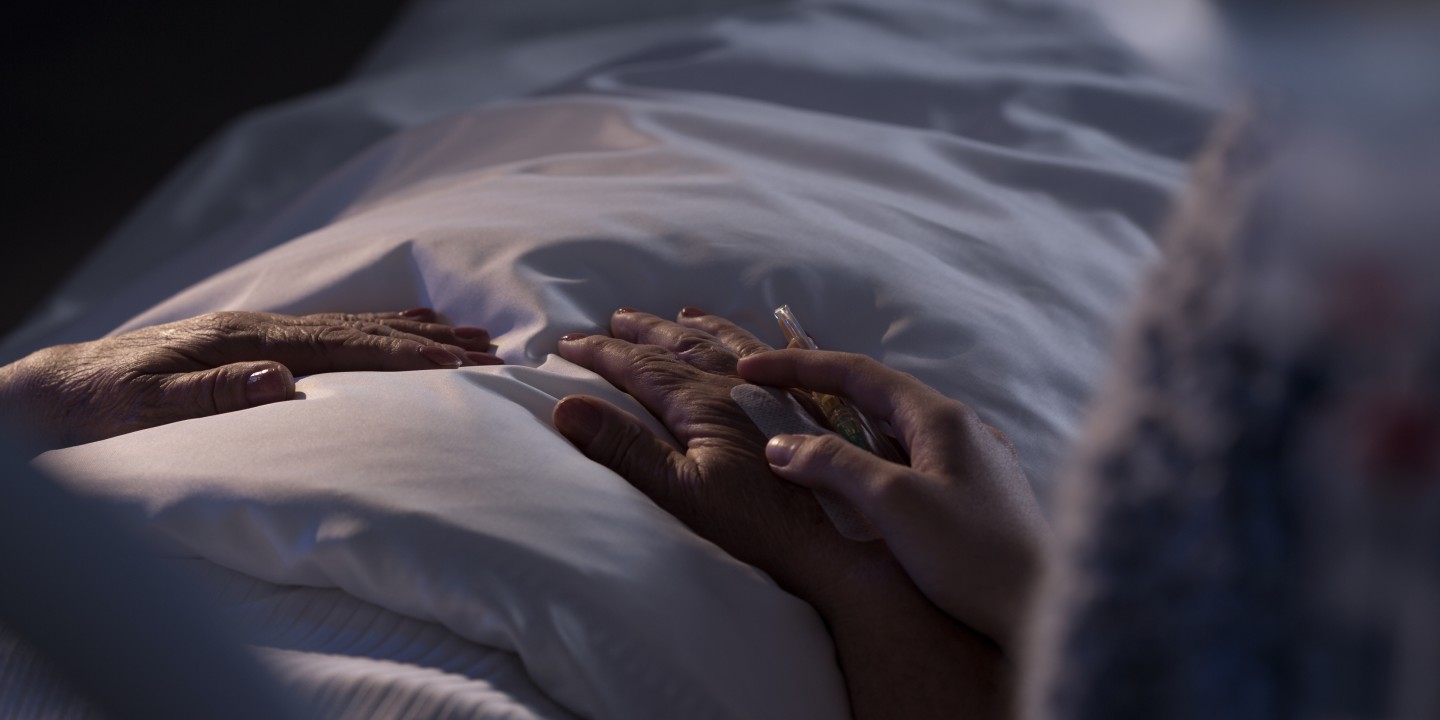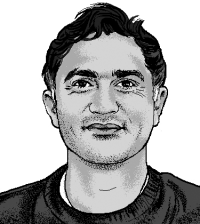At the deathbed of a man who cared for others
Every week, Cameron visited the lonely and afflicted. Now I’m visiting him.

When I arrive at the intensive care unit, the doctor tells me that Cameron is unresponsive, that he will die soon, very soon, perhaps that night.
I stare at Cameron through the sliding-glass door. He’s lying on a bed with tubes and wires connecting his body to machines and translucent bags of fluids—saline and morphine, the doctor briefs me, to keep him hydrated and dull his pain. As I open the door, I hear a beep coming from a monitor suspended above him, a monotonous tone keeping time with his heart’s pulse, reminding doctors and nurses and me that he’s still alive, despite the lifelessness of his glazed eyes.
Sitting beside his bed, my tears dripping on his sheets, I reach my hand to his. My fingers quiver as we touch. I expect the warmth of my palm to awaken life in his. I expect his hand to grasp mine in return—the unspoken rule of hand holding, of mutual recognition, the instinctual acknowledgment of touch. But his hand is limp, his skin cold and dry.
Read our latest issue or browse back issues.
Sebastian Moore’s words flash into my mind, about the moment “when all the mysteries of God will be revealed in the clasp of your brother’s hand.” I clasp Cameron’s hand with both of mine and wait for revelations, for his flesh to unveil the mystery of death, the secrets of God. I look into his half-open eyes for a sign, but his blank stare gazes through me, beyond me, at nothing. Weariness is frozen on his face.
I tell him that I love him, that I’m going to miss him, and I whisper a prayer, asking God to comfort his body and keep watch for his soul. I murmur jumbled words while hospital machines drone around me and Cameron’s chest rattles with each dying breath.
Years ago, Cameron invited me to join him for one of his weekly visits to an assisted living home. The staff greeted him by name as we walked a labyrinth of halls on our way to see two residents. Cameron knocked on an open door, and the man inside shouted for us to come in. His face brightened when he saw Cameron. I followed as Cameron walked across the room and bent over the man’s bed for a delicate hug. Cameron’s friend reached for my hand, grasping it for a moment, then invited us to have a seat.
Cameron pulled a copy of the New York Times from his grocery bag. “This one’s his favorite,” he whispered to me. Then he began to read the paper aloud, page by page, front to back.
After an hour or so we said good-bye, and I followed Cameron down the hall to another room, where he introduced me to a woman sitting in a chair. She didn’t recognize Cameron but greeted us with a guarded smile, welcoming us into her room. She was glad to have visitors, she mumbled. As we sat down, Cameron took out the Wall Street Journal, and she recognized it as her favorite paper. After reading to her for a while, he asked me to take a turn.
Driving back to Cameron’s apartment, I asked him how he had decided to spend time with those two people. He described his first trip to the assisted living home, when he asked the staff if he could visit residents who didn’t have any visitors. They gave him a list of names, people who spent most of their days alone, and he worked his way through the list, asking each person what they would like him to read to them. Each week he would sit with people, talking and reading—two people this week, another two next week.
At the ICU, the night staff begins its shift. I slide my phone from my pocket and thumb an e-mail to our congregation, letting them know that Cameron will die soon. If they want to say goodbye, they should visit him now.
The next morning, I return to the hospital to sit with Cameron. I know he has always hated being alone, and I can’t bear to leave him companionless as he dies. I walk through the ICU toward his room.
As I get closer I hear singing: Mennonite singing, in four-part harmony. Members of our church are in his room, at least a dozen, all of them standing around his bed. They are filling his room with their voices, encircling him with the music of heaven, embracing him in the love of Christ’s body. They are drawing him into communion with us and with God.
We close with the benedictory hymn “God Be with You till We Meet Again,” and then people go home. I stay. Two hours later, Cameron stops breathing. Lifting my hand to his forehead, I trace a cross on his skin. “From ashes to ashes,” I whisper, “from dust to dust.”
Cameron had three Bibles—big, heavy editions that take up most of my desk when I open them. I flip the pages, pausing on the paragraphs streaked with highlighter or underlined with ink. Most of the passages marked are in the Psalms or the Gospel of John. “According to your steadfast love, O God, remember me.” “Turn to me and be gracious to me, for I am lonely and afflicted.” “My times are in your hand.” “I will come again and will take you to myself, so that where I am, there you may be also.” A refuge for the afflicted, steadfast love for the lonely, companionship for the forgotten—that’s the nature of Cameron’s God.
Every Sunday, Cameron was with us for worship. During our time of sharing—when anyone can offer reflections, comments, supplications, and thanksgivings, a moment that often stretches into eternity—he would offer the same prayer. Week after week, Cameron would ask us to pray for people without homes, people in hospitals and prisons, and anyone stuck where they didn’t want to be.
His petition was an act of solidarity, a call to remember who we forget: people hidden from us, people from whom we hide ourselves—God’s children everywhere who pray the words of the psalmist, “Remember me, O Lord, for I am lonely and afflicted.” Cameron refused to let us think of ourselves without all the beloveds of God who long for companionship, all of us who long to know that we occupy the thoughts of another and the mind of God.
The Sunday after Cameron’s death, I stand behind the pulpit and lead my congregation in prayer, trying to forget Cameron’s cold hand and his glazed eyes, to displace images of his dying with memories of him reading to people who are all alone. My voice trembling and my closed eyes swimming in tears, I offer Cameron’s words on our behalf—his petition for people without homes, for people in hospitals and prisons, for anyone who is stuck where they don’t want to be.
He’s dead and buried, his body returned to the earth. But when we pray his prayer, the ashes and dust buried outside our church come alive again. His words become mine, and I speak in tongues. His body visits mine, and his spirit breathes through our lives.
A version of this article appears in the February 1 print edition under the title “Death of a caregiver.”






